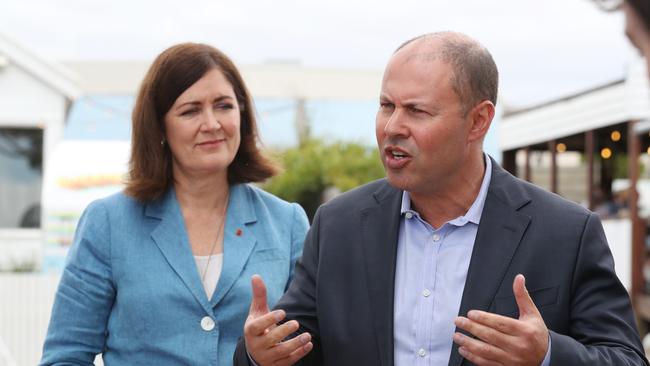Google ‘must pay for news, not block it’: Josh Frydenberg
Josh Frydenberg criticises Google for blocking news links, saying tech giants should focus on paying for news, not burying it.

Josh Frydenberg has criticised Google for blocking news links for some Australian users and said the tech giants should focus on paying for news rather than burying it.
The Treasurer, who has helped steer the government’s handling of Big Tech, said on Thursday he wouldn’t be deterred from pursuing world-first media bargaining legislation that would force Google and Facebook to pay for news.
“Google, Facebook and other digital giants should focus not on blocking users in Australia accessing domestic content, they should focus on paying for it,” Mr Frydenberg said.
“The digital giants should focus on paying for original content, not blocking it. That’s my message.
“We have introduced legislation, that’s now before a Senate committee, to put in place a world-leading mandatory code to see those digital giants pay traditional news media businesses a fair sum of money for those news media businesses generating original content.
“That is a world-leading scheme we are putting in place. It has been acknowledged not just by regulatory agencies but by other governments around the world.
“It is going to have a final arbitration model in place, and it is going to be a very significant advancement for our domestic media businesses.”
Google said on Wednesday it was burying links from traditional media outlets in some search results, in an escalation of the dispute between mainstream publishers and the tech giant.
If the media bargaining legislation passes, Google and Facebook would be forced into mediation with publishers over the value of their news, and would face fines of up to $10m if they failed to comply. Scott Farquhar, the billionaire co-founder of Australian tech giant Atlassian — which is a product partner of Google — said the search giant was being backed in to a corner and would likely exit the Australian market.
“The precedent of charging for links and snippets is a fundamental threat to the open internet, not just Google,” Mr Farquhar told The Australian.
“The way the legislation is currently drafted is crazily restrictive; the media industry and the government are backing Google into an impossible corner. The way we look at it, the only rational move is for Google to exit Australia.
“And that is massively damaging to our country; it damages our GDP, our business communities, our education systems, and almost every part our lives.”
Mr Farquhar said the code was another example of the government introducing measures that punish technology firms, while also wanting to foster the digital economy. “No one wants to see journalism fail in Australia but this proposal is not the solution to that problem,” he said.
“It does not even guarantee that the funds will create or replace lost jobs in journalism.”
A Google spokesman described the “experiment” as one of tens of thousands it conducted every year.
“We’re currently running a few experiments … to measure the impacts of news businesses and Google Search on each other,” the spokesman said.
If Google were to hide commercial media outlets from its search results, that may allow it to dodge the looming legislation.
Facebook has threatened to block news from its platform altogether in Australia if the legislation passes.
Additional reporting: Rosie Lewis



To join the conversation, please log in. Don't have an account? Register
Join the conversation, you are commenting as Logout